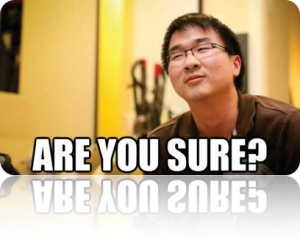 Are You Sure?
Are You Sure?
I posted a job on UpWork.com to hire a virtual assistant to help convert several hundred links into URL shortened links. The project would take less than a day but I had so many other things to do that I thought that a virtual assistant would be something that I would want to try and perhaps use for future projects.
I posted the project and received dozens of bids. I rate bids in the following order: 1) If they make a connection with me by referencing something specific in my project; 2) If I have given them a task (like send me a link to work you have completed) that they do the task; and, 3) Their bid amount reflects the skills that they bring to the table (not just the lowest bid).
What I sometimes do is hire more than one freelancer for the same project because if I am working on a deadline I get to choose the best results from a selection instead of having to go back to the drawing board with little or no time left on a deadline. I also get to compare differences in the quality of work and eventually find someone I can build a relationship with.
For my URL shortened links project I hired two freelancers. Freelancer A gave me a bid of $60. I liked Freelancer A because she referenced my project and did the task I assigned. Freelancer B bid $31 but didn’t reference my project as much but gave me his impressive resume. After awarding both bids Freelancer A went right to work but the next day Freelancer B sends me a note asking me to increase the project to $50 because he couldn’t do it for $31.
I had several options at this point but instead of insisting that he honor his bid since he had full scope of the project beforehand I decided to take a different approach. I said, “I could do that, but are you sure you want me to do that? Are you sure that you want me to give you more money after you submitted a bid knowing full well the scope of the project? Are you sure you want me to change my expectations given the fact that I have 20 or more projects that need to be assigned? Are you absolutely sure? Because I will do that but you need to be absolutely sure?”

Would I ever use Freelancer B again? Maybe, but he is not at the top of my list. If I didn’t give him feedback and just updated the project at his request I would be adamant to never use him again and I might have left him a poor rating stating his bait-n-switch tactics.
But how many of us get the opportunity to get feedback before we make a decision with negative consequences? How many of us are asked the question, Are you sure? before going down one path or the other? There are a number of times in my life where I wish I had someone ask me if I was sure of what I wanted to do and then paused long enough to change my mind—like taking that job with a two hour commute, or investing in real estate in 2007 before the crash, or dating this jerk I met in college (don’t worry, I won’t mention Darryl’s name).
I had to think about when do I need to pause and ask myself am I making the right decision because if I paused at every instance I would never get any work done. I make routine decisions every day which don’t require much thought, but for those crossroad decisions I have developed this process:
- Give credence to your first impression (intuition). What is my first impression? Is what I am about to do, at my first thought, good or not-so-good? First impressions are important and need to be heeded more than they are. If my first impression says what I want to do is a go, I move on to the next step.
- Think through your possible decision (reason). This seems like a no-brainer, especially if the first impression says “Go.” But most people do not take the time to thoroughly digest their possible decisions and the likely consequences thereof. If you get a “go” after thinking things through and from your first impression, move on to meditation.
- Meditate upon the possible decision (spirit). There is so much wisdom in our unconsciousness and we so seldom take advantage of it. Tapping into this great reservoir only makes sense. See what “bubbles up” from the unconsciousness when you are still enough, in meditation, to hear what is being said to you.
Other tips that have helped me include:
- Try to get as much information as you can about the decision you have to make.
- Try to determine at least two or three different possible choices you can make.
- Identify and write down the positives and negatives of each possible decision.
- Try to imagine the possible implications of each decision and write it down next to the positive and the negative.
- Write down how you think you will react to these implications, and how you wish to react.
- Take another good look at what you have written and make your choice. Trust yourself to be able to handle any good or bad implication resulting from your decision.
Doing it this way helps you picture the problem, the possible decision you can make, the pros and the cons of each as well as your possible reaction to each. It empowers you to make an informed decision and allows you to prepare yourself for the possible implications.
How long should the limit of time or deadline be? It depends on how much thinking or research you have to do to make a good decision. Set a limit of time or deadline you think is reasonable. And then stick to it. If the decision you’re making is what to eat for dinner, the limit of time should be short. You might set a limit of time of 60 seconds.
But if the decision is more complicated, such as what house you should buy, set a deadline instead of a time limit. Specify which date you should have made a decision. Once the “decision day” comes, it’s time to make your decision. Even if you feel like you need more time and have a feeling of uncertainty about your decision, make your decision anyway. Doing so will avoid analysis paralysis because the “perfect” decision will never come.
We must make decisions. Some will be good, others will be bad. If you are willing to pause and ask yourself, Are you sure? I am sure that you will make better choices with less negative consequences.





